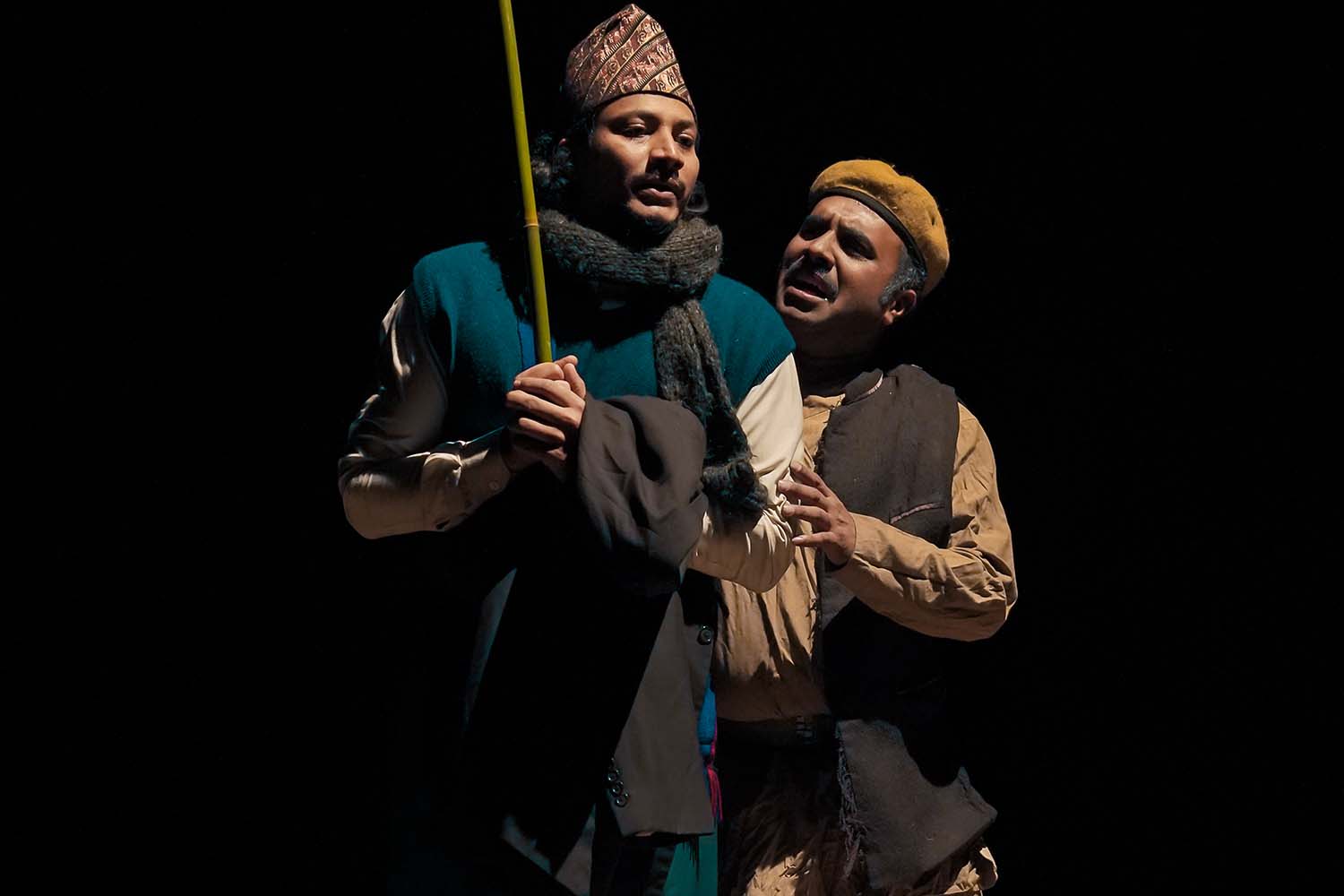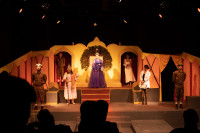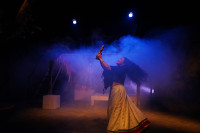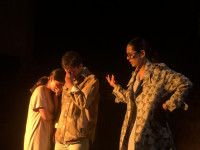Theater
Echoes of a lonely heart
‘Hari Hajurba’ at Mandala Theatre intertwines a personal story of loss and longing with the socio-political landscape of Nepal’s past.
Sanskriti Pokharel
Ah, Saturday mornings—basking in the warm embrace of the winter sun, savouring the sweetness of oranges, and rejoicing in the peace the weekend offers. Yet, as much as I enjoy these peaceful moments, Saturday makes me restless. The question of how to spend the day clouds my sense of calm.
While scrolling through Instagram, I stumbled upon a post from Mandala Theatre. Their latest play, ‘Hari Hajurba’, was showing. In that instant, my dilemma vanished. I knew exactly how to spend my day.
Actor Najir Husen wrote, conceptualised, and directed the play, starring alongside actor Bijay Baral.
Before the play starts, the faintest glow of light reveals the silhouette of a house with a tree standing behind it.
As the lights get a little brighter, heralding the start of the play, the audience notices a radio outside the house, a sweater hung on the outer side wall and, most importantly, the solitary tree bearing just a single leaf.
The tree caught my attention, reminding me of O Henry's short story ‘The Last Leaf’. The play, like ‘The Last Leaf’, is crafted to evoke emotions and touch the heart.
Then, Hajurba (Bijay Baral) emerges from the audience and repeatedly asks, ‘Kopila lai chinchau?’ (Do you know Kopila?). He walks to the stage, sits in front of his house and listens to the radio. Radio Nepal broadcasts news of those who have returned home after the peace agreement. The presenter announces their names.
This makes the audience aware that the play is set in 2006. While the presenter announces the names, Hajurba listens carefully. Then, to his dismay, the radio ceases to play. He cannot hear the name he has longed to hear—Kopila, his dear granddaughter.
Kopila was taken from her Hajurba during the time of People’s Movement Two. One day, armed individuals from the jungle unexpectedly arrived at their house. They demanded that Hajurba let them take Kopila to join the revolution. They tried to cajole and coerce him into agreeing. Hajurba was adamantly opposed to sending her away. Despite both Hajurba and Kopila refusing, the armed men stubbornly took her away, leaving Hajurba heartbroken.
This reminded me of the stories of People’s Movement Two that my grandparents used to tell me. They told me that the Maoists used to come to people’s homes and blackmail them. They forcefully took away sons and daughters from many families. Their actions instilled fear among the villagers. To escape the Maoists, many people migrated elsewhere, leaving the village nearly deserted. Watching this play felt like watching the story my grandparents used to tell me.

Hajurba is a man broken by life’s tragedies. After losing his wife at a young age, his granddaughter Kopila is the sole reason for his existence, the light in his otherwise dark world. Ever since she left, he has clung to the hope of her return, which grows stronger daily. Time drifts by, but his longing only strengthens, rooted in his love for Kopila.
Just like the single leaf on the barren tree outside his home, Hajurba is alone. His solitude extends beyond his house; it engulfs the entire village, abandoned by its inhabitants who migrated to other places. Hajurba, however, refuses to leave. The possibility of Kopila’s return keeps him tethered to this desolate place. The lone leaf on the tree becomes a symbol of his life—fragile yet resilient, holding on despite everything.
The depth of Hajurba’s character is something spectators cannot help but notice and feel. His every action, expression, and movement reflects his quiet sorrow and enduring love. Tasks like drying radio batteries under the sunlight to hear Kopila’s name on the radio speak volumes about his innocence and hope. His crumpled and torn daura suruwal, paired with his house in disrepair, reveals his indifference toward his well-being.
Even on cold winter nights, Hajurba sleeps outside, ignoring his health. Nothing else matters to him—not his comfort, not his health, not even his life. His granddaughter’s longing becomes his primary focus. Every aspect of Hajurba’s existence revolves around love, hope and the pain of his longing for her.
Eventually, Hari (Najir Husen), a postman, meets Hajurba while delivering letters. The old man’s welcoming nature draws Hari into his home and, gradually, into his life. Over time, Hajurba shares his sorrow and longing for his granddaughter with Hari.
Unable to see Hajurba in such a sorrowful state, Hari comforts him with a lie. He reads a letter to Hajurba, claiming it is from Kopila—though it was neither written nor sent. In the letter, Hari assures Hajurba that Kopila is doing well and will return soon. Hearing this fills Hajurba with sheer joy, and his worries seem to vanish.
This scene was heartbreaking to watch. It portrays the fragility of hope. Hajurba’s longing for his granddaughter, the only family he has left, is so intense that he clings to even the faintest sign of her existence.
The audience knows the letter isn’t real, and while Hajurba feels momentary joy, the truth lingers in the background. This makes his fleeting joy more painful to witness.
This play seamlessly integrates musical performances, Kathak, and poetry elements into its storytelling, enriching the narrative. While the play is deeply poignant, it also includes moments of laughter. Remarkably, the humour never overshadows the emotional depth of the story. The play beautifully captures the essence of human longing, hope, and pain.
Ultimately, ‘Hari Hajurba’ leaves an indelible mark on its audience. It intertwines a personal narrative with the larger socio-political fabric of Nepal’s past.
Above all, this play encourages the audience to appreciate Nepal's socio-political situation. While far from perfect, it reminds us to value the peace we enjoy and to recognise even the minimal contributions made by our elected leaders.
‘Hari Hajurba’
Director: Najir Husen
Cast: Najir Husen, Bijay Baral, Sabina Thapa, Rohit Shah
Duration: 1 hour 10 minutes
Venue: Mandala Theatre, Thapagaun, New Baneshwar
Showtimes: Every day at 5:15 pm except Monday and an extra 1:00 pm show on Saturday until January 12




 9.6°C Kathmandu
9.6°C Kathmandu










